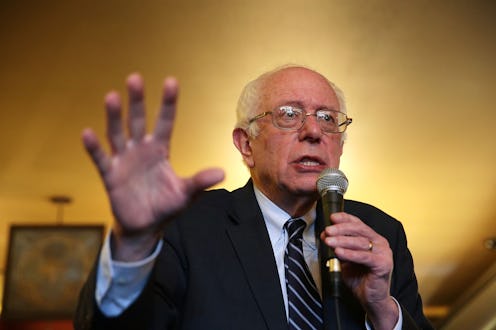News
If Bernie Wins Iowa, The Struggle Gets Real
The Iowa caucuses are just a few days away, and it looks like the Democratic race will truly come down to the wire. Hillary Clinton and Bernie Sanders have been polling within several percentage points of each other for weeks, and while the statisticians over at FiveThirtyEight peg Clinton as the heavy favorite to win, those who #FeelTheBern are still holding out hope for a Bernie upset. But even if Sanders wins in Iowa, he'll still have quite a bit of work cut out for him.
Historically, winning in Iowa hasn't meant all that much. In the last nine Democratic primaries, the victor in Iowa caucuses has gone on to win the party's nomination six times. That's two out of three — not a bad success rate, but not an amazing one, either. Furthermore, only twice has a Democrat who won Iowa actually gone on to win the presidency. (That would be Jimmy Carter in 1976 and Barack Obama in 2008.)
Nevertheless, winning the Iowa caucuses does have other advantages, including the loads of free media that's bestowed upon the winner. With it, victory in Iowa can help create a perception early on that a candidate is actually the real deal — that they deserve to be taken seriously. That might not matter much to a Washington, D.C. fixture like Hillary Clinton, but it matters a whole lot to Sanders, who up until very recently was an obscure socialist from one of the smallest states in the country.
For that reason, Iowa would be an important early win for Sanders, and the same logic also applies to New Hampshire, which he's even more likely to emerge from as the victor. At the same time, a Sanders win in Iowa would say very little about his chances in the rest of the primary states, because Iowa is uniquely and unusually tailored to Sanders' strengths as a candidate.
In short, Sanders strongest level of support comes from white liberals, and white liberals make up a huge chunk of the Democratic voting electorate in Iowa. In fact, Democrats are more white and liberal in Iowa than they are in all but two other states: Vermont and New Hampshire. That's a big reason why Sanders' support is so high in the first two voting states.
The problem is that most of the Democratic Party is not white and liberal. That second part may sound a bit counterintuitive, but in fact, only 41 percent of Democrats describe themselves as "liberal." As a consequence, self-identified moderates and conservatives actually make up the majority of the Democratic Party in the United States, and those subgroups support Clinton over Sanders by a 30 point margin.
Sanders' support among non-whites is also lacking. A Fox News poll from June, for example, had only 5 percent of black Democratic primary voters supporting Sanders' presidential bid. A CNN poll from around the same time had similar results, with Sanders pulling the support of just 9 percent of non-white Democrats. His standing among minority voters has improved slightly since then, but he's still far, far outpaced by Clinton. In December, Clinton led Sanders by 43 (!) points among non-white voters nationally; by January, that lead had actually grown to 50 points.
One side note: Bernie Sanders' supporters have frequently clashed with the Black Lives Matter movement, and it's tempting to blame this tension for Bernie's deficit with non-white voters. Without wading into that (much larger) debate, I'll point out that there are confounding demographic factors that make it very hard to draw any firm conclusions about exactly why Sanders is having a hard time attracting non-white support. For example, he also does poorly among lesser educated voters, and those voters tend to be both less liberal and disproportionately non-white. It is, as in so many cases, a situation where it's difficult to separate causation from correlation.
The point, though, is that Sanders is struggling with both minority voters and more moderate Democrats. That won't be much of a problem in Iowa, New Hampshire, or Vermont, but it'll be a huge problem in states like Texas and California, where whites don't make up 90 percent of the Democratic Party. If Sanders wins Iowa, his battle will only be beginning, and it'll be quite the battle indeed.
